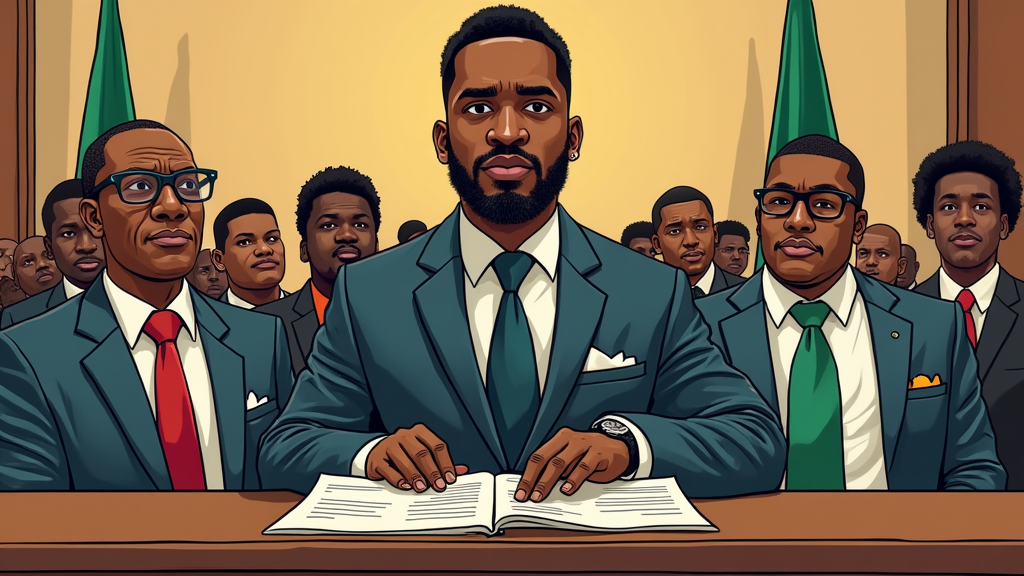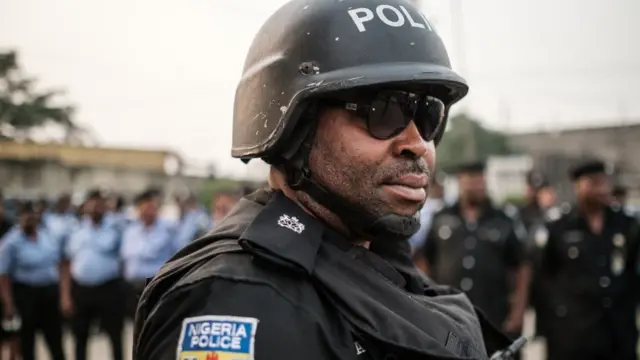The recent bail conditions imposed on human rights activist Omoyele Sowore by Justice Musa Liman have stirred up significant controversy in Nigeria. Initially, the Federal High Court ruling allowed Sowore to secure bail with a N10 million requirement, contingent upon proper documentation from any individual in the Federal Capital Territory. However, the judge later introduced additional bail requirements, mandating that Sowore provide a surety with a landed property and Certificate of Occupancy—clauses that were not part of his original ruling. This unexpected turn has left Sowore’s legal team scrambling to address the new conditions, raising questions about the integrity of the judicial process and the role of the Nigerian Police in enforcing such controversial bail requirements. As discussions surrounding this court ruling controversy unfold, many are left wondering how these developments will impact Sowore’s fight for justice and the broader implications for human rights in Nigeria.
In the unfolding saga regarding Omoyele Sowore’s release from custody, the bail stipulations set forth by Justice Musa Liman have become a focal point of debate among legal experts and activists alike. The initial provisions allowed for a straightforward bail arrangement, only to be complicated by later adjustments that included the necessity for a surety possessing tangible assets. This situation has not only drawn attention to Sowore’s personal case but has also highlighted larger issues concerning the treatment of activists by the Nigerian legal system. As Sowore continues to challenge these conditions, the conversation shifts towards the implications of such legal maneuvers on civil liberties and the role of the judiciary in safeguarding human rights in the country. The controversy surrounding these bail conditions raises important questions about the balance of power between individual rights and state control.
Understanding Sowore’s Bail Conditions
The bail conditions set by Justice Musa Liman for Omoyele Sowore have ignited a significant debate regarding the intersection of law and human rights in Nigeria. Initially, the judge indicated that Sowore could secure bail by meeting a N10 million requirement, but later introduced additional stipulations that complicated the process. Specifically, the demand for a surety possessing a landed property and Certificate of Occupancy deviated from the original terms presented in open court, raising questions about transparency and fairness in judicial proceedings.
For Sowore and his legal team, these unexpected bail conditions represent not only a hurdle in securing his release but also a broader issue concerning the rights of activists in Nigeria. The introduction of such conditions, especially in a country where legal processes can often seem arbitrary, underscores the complexities faced by human rights defenders. The situation emphasizes the need for clarity and consistency in judicial rulings, particularly in politically charged cases that attract public attention.
The Role of Justice Musa Liman in Sowore’s Case
Justice Musa Liman, presiding over the Federal High Court, plays a pivotal role in the ongoing saga involving human rights activist Omoyele Sowore. His decisions have not only legal ramifications but also societal implications, as they reflect the judiciary’s approach to handling cases involving dissent and activism. The judge’s initial ruling seemed straightforward, yet the subsequent amendments to bail conditions have raised eyebrows and sparked controversy, particularly among advocates of civil liberties.
This evolving narrative highlights the precarious balance that judges must maintain between upholding the law and ensuring justice is served without bias. The controversy surrounding Liman’s bail conditions illustrates the broader struggle within the Nigerian legal system, where the interpretation of laws can sometimes appear to be influenced by external pressures. As public scrutiny increases, the actions of figures like Justice Liman will continue to be closely examined, emphasizing the importance of accountability within the judiciary.
Implications of the Court Ruling Controversy
The controversy surrounding the bail conditions imposed on Omoyele Sowore by Justice Musa Liman serves as a critical case study in the ongoing discourse about judicial integrity and human rights in Nigeria. The unexpected changes to the bail terms have raised significant concerns among legal experts and human rights advocates, who argue that such arbitrary decisions undermine the rule of law. Moreover, the implications of these rulings extend well beyond Sowore’s case, potentially influencing the treatment of future detainees who speak out against government actions.
This situation also reflects the broader challenges faced by the Nigerian legal system, where the intertwining of politics and the judiciary can lead to questionable practices. As activists like Sowore advocate for transparency and fairness, the response from the judiciary will be critical in shaping public trust in legal institutions. The ongoing discussions around Sowore’s bail conditions highlight the essential need for reforms to ensure that human rights are preserved and respected within the Nigerian judicial framework.
Human Rights Activism and Legal Challenges in Nigeria
Human rights activism in Nigeria is often met with significant legal challenges, as illustrated by Omoyele Sowore’s recent experiences with the judicial system. Activists frequently face stringent bail conditions and other legal hurdles that can undermine their efforts to advocate for justice and accountability. The case of Sowore underscores the risks associated with standing up against perceived injustices, particularly when the legal system appears to be manipulated to serve political ends.
The implications of such legal challenges extend beyond individual cases, impacting the broader landscape of civil rights in Nigeria. As human rights activists like Sowore continue to confront these obstacles, the need for public awareness and advocacy becomes increasingly vital. The legal community, alongside civil society organizations, must work relentlessly to safeguard the rights of individuals who challenge governmental authority and to ensure that the rule of law prevails in all circumstances.
The Role of the Nigerian Police in Bail Conditions
The involvement of the Nigerian Police in determining bail conditions for activists like Omoyele Sowore has raised critical questions about the intersection of law enforcement and human rights. Sowore’s initial refusal to accept the police’s bail terms, which required him to secure a guarantor at a high civil service level, showcases the challenges faced by individuals navigating the legal system in Nigeria. This scenario highlights the perceived inequities in the bail process, especially for those opposing government actions.
The Nigerian Police’s role in setting such conditions not only reflects their stance on dissent but also illustrates how legal processes can be influenced by law enforcement agencies. As activists continue to resist oppressive measures, the need for reforms within the police force becomes apparent. Ensuring that bail conditions are fair and just is vital for fostering a legal environment that respects human rights and supports the work of activists.
Legal Representation and Advocacy in High-Profile Cases
In high-profile cases like that of Omoyele Sowore, the role of legal representation is crucial in navigating the complexities of the judicial system. Sowore’s legal counsel, Femi Falana, has been vocal in challenging the legality of the bail conditions imposed by both the police and the court. His advocacy underscores the importance of having experienced legal representation to contest potentially unjust rulings and to protect the rights of clients facing politically motivated charges.
The engagement of skilled legal practitioners in high-stakes cases not only aids individuals like Sowore but also contributes to broader legal reforms in Nigeria. By highlighting instances of judicial overreach or police misconduct, advocates can push for changes that benefit all citizens. The ongoing legal battles in Sowore’s case serve as a reminder of the vital role that lawyers play in championing justice and defending civil liberties in a challenging environment.
Public Reaction to the Bail Conditions
Public reaction to the bail conditions imposed on Omoyele Sowore has been overwhelmingly critical, with many viewing the additional requirements as a deliberate attempt to hinder his release. Social media platforms have become a battleground for discussions surrounding the implications of Justice Musa Liman’s ruling, with many advocates calling for transparency and justice within the Nigerian legal system. The public’s discontent reflects a growing awareness of the challenges faced by human rights activists in Nigeria.
As Sowore’s case garners attention, it highlights the importance of civic engagement in advocating for the protection of human rights. The backlash against the bail conditions showcases the power of public opinion in influencing legal and political outcomes. Activists and ordinary citizens alike are increasingly vocal about the need for accountability, emphasizing that the fight for justice is a collective endeavor that transcends individual cases.
The Importance of Transparency in Judicial Proceedings
Transparency in judicial proceedings is essential for maintaining public trust in the legal system, particularly in cases involving human rights activists like Omoyele Sowore. The controversy surrounding Justice Musa Liman’s bail conditions raises significant concerns about the clarity and consistency of judicial rulings. When judges make decisions that appear arbitrary or inconsistent, it undermines confidence in the rule of law and can have detrimental effects on the rights of individuals facing legal challenges.
Ensuring that judicial processes are transparent is crucial for fostering an environment where justice can be served equitably. Legal reforms aimed at increasing transparency and accountability within the judiciary are needed to prevent abuses of power and protect the rights of citizens. As the case of Sowore continues to unfold, the call for greater transparency in judicial proceedings will remain a vital issue for advocates of human rights and the rule of law in Nigeria.
Prospects for Legal Reform in Nigeria
The ongoing legal challenges faced by activists like Omoyele Sowore have sparked discussions about the need for legal reform in Nigeria. The inconsistencies in bail conditions and the perceived biases within the judicial system underscore the necessity for a comprehensive review of existing laws and practices. Advocates argue that reforming the legal framework is essential for protecting human rights and ensuring that the justice system serves all citizens fairly.
As public awareness of these issues grows, there is an increasing demand for reforms that address the systemic challenges within the legal system. Stakeholders, including legal practitioners, civil society organizations, and policymakers, must collaborate to create a more just and equitable legal environment. The prospects for legal reform in Nigeria hinge on the collective efforts of those committed to championing human rights and ensuring that the rule of law prevails.
Frequently Asked Questions
What are the bail conditions set by Justice Musa Liman for Sowore?
Justice Musa Liman set bail conditions for Omoyele Sowore that initially included a N10 million bail requirement, but he later added the necessity for a surety with a landed property and Certificate of Occupancy, which was not part of his original ruling.
Why did Sowore refuse the police bail conditions related to his detention?
Sowore refused the police bail conditions because they required him to present a level 17 civil servant as a guarantor, which he described as illegal and a joke. He opted to remain in detention rather than comply with what he viewed as corrupt demands.
How has Sowore’s legal team responded to the bail conditions imposed by Justice Liman?
Sowore’s legal team has sought to rectify the additional bail conditions imposed by Justice Musa Liman, which included the requirement for a surety with landed property. They approached the court’s registrars to address these changes, but the judge declined to amend his ruling.
What was the controversy surrounding Justice Musa Liman’s ruling on Sowore’s bail conditions?
The controversy arises from Justice Musa Liman’s decision to insert additional bail conditions after his initial ruling in open court, which included unexpected requirements that complicated Sowore’s ability to perfect his bail within the granted timeframe.
What implications do Sowore’s bail conditions have for his legal situation?
Sowore’s bail conditions complicate his release from detention, as the newly added requirements make it difficult for him to meet the court’s demands within the 24-hour period, potentially prolonging his detention.
How did Sowore react to the potential loss of his passport in relation to his bail conditions?
Sowore expressed strong opposition to the targeting of his passport, stating that he would not allow corrupt practices to dictate his situation, emphasizing his refusal to be bailed out under conditions that compromise his integrity.
What previous bail conditions did Sowore reject before the court’s ruling?
Before Justice Liman’s ruling, Sowore rejected police bail conditions that required him to provide a level 17 Permanent Secretary as a guarantor, deeming such conditions as inappropriate and illegal.
What stance did Sowore’s legal counsel take regarding the legality of the bail conditions?
Sowore’s legal counsel, Femi Falana (SAN), supported Sowore’s refusal to comply with the police bail conditions, referencing previous court rulings that deemed similar bail requirements illegal, reinforcing Sowore’s fight for his rights.
| Key Points |
|---|
| Judge Musa Liman imposed controversial bail conditions on Omoyele Sowore. |
| Initial bail requirement was N10 million, allowed with documentation from any resident of the Federal Capital Territory. |
| A new condition was added requiring Sowore to provide a surety with landed property and Certificate of Occupancy. |
| Sowore’s legal team sought clarification from the judge, but he refused to amend his ruling. |
| The new bail condition complicates Sowore’s release within the 24-hour timeframe given by the judge. |
| Sowore previously rejected police bail terms, deeming them illegal and a threat to his integrity. |
| His legal counsel, Femi Falana, supports Sowore’s refusal based on previous court rulings. |
Summary
Sowore bail conditions have become a pivotal issue in his ongoing legal troubles. Justice Musa Liman’s controversial addition of new conditions has created significant hurdles for Sowore’s release. Initially, the bail was set at N10 million, but the unexpected requirement of a surety with property has complicated matters further. Sowore’s rejection of both police and judicial bail conditions reflects his broader stance against perceived legal injustices, backed by his legal team. This situation highlights the ongoing tensions surrounding Sowore’s activism and the legal system in Nigeria.



